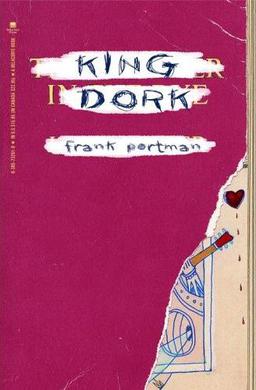- The central character was a member of a band that changed names more often than most people change their underwear.
- Something or other about Catcher in the Rye figured into the action.
- I loved the book. Like top ten of the year loved it. (The rest of my top ten that year: Cat’s Eye, The Uncommon Reader, The Yiddish Policemen’s Union, Sacred Games, 20th Century Ghosts, St. Lucy’s Home for Girls Raised by Wolves, The Beautiful Miscellaneous, Three Bags Full, and Maisie Dobbs.)

I’m not a rereader of books, usually. I can count on two hands the books I’ve reread for pleasure as an adult—the first six Harry Potters, The Hitchhiker’s Guide to the Galaxy, The Moviegoer. And now King Dork. And a pleasure it most certainly was, as things came back to me rapidly and I remembered just how much I had loved the book in 2007.
Meet King Dork, real name Tom Henderson. Sophomore. Alias Moe, alias Chi-Mo, Henderpig, alias Henderfag, alias Henderfuck, alias a whole lot of other names. Some of them are the names he gets addressed by on a daily basis by his Psychotic Normals who inhabit his school, some of them are the names that he gives himself as a member of his band. A band that constantly changes names, but always maintains a lineup: Tom under one pseudonym on guitar, Sam Hellerman (Tom’s one friend, thanks to alphabetical order) under a different pseudonym on bass and another noun (Scientology, calligraphy, etc.). They’ve all got first album titles and logos, too. They don’t actually have music, but that’s a small thing to get by.
Tom’s life is overshadowed by the loss of his father, a much-liked police officer who died in a mysterious car accident some time earlier. Now Tom’s got to deal with a loving but troubled mother, a bratty little sister, and a well-meaning if ineffectual hippie stepfather, in addition to all of his other troubles—the Psychotic Normals, the weird and nasty assistant principal Mr. Teone, the girls who completely ignore him, the English teachers whom he is convinced are all members of the Catcher Cult (as in in the Rye, a book that Tom despises).
And then he makes out with a gorgeous girl at a party. And finds a box full of his dad’s books in the basement—books that his dad read at about Tom’s age, during the sixties. Books that contain what seems to be a secret code, which Tom is convinced might hold the key to figuring out just who was responsible his dad’s death. A pair of searches will ensue—one hunt for a mystery girl who doesn’t seem to exist, and one for the truth behind a mystery that seems to have only questions and no answers.
Here’s the thing about King Dork: the plot is not out of the ordinary. You probably figured that out by now. But Frank Portman—who’s probably better known under his own pseudonym, that of Dr. Frank, under which name he has led the punk band The Mr. T Experience for close to thirty years—is an extraordinary writer. King Dork is consciously seeded throughout with parallels to Catcher in the Rye (a book which I will admit to never actually having read, and I fear that at 32 I may now be too old to properly get), but the book that it brings most to my mind is that other contemporary legend of high school outsider lit: The Perks of Being a Wallflower by Stephen Chbosky. Tonally, the two books couldn’t be more different—Perks is sad and meditative, while King Dork, even at its darkest, is frequently hilarious—but they share a certain gorgeousness of prose. Portman’s writing is the kind that makes me wish I could commit a book to memory like in Fahrenheit 451, just so that I could quote vast swaths of it at will.
King Dork to wed Homecoming Princess. News at eleven. It’s a nice thought, and it turns up all the time in movies and books. The one minor problem is that in reality, it never happens. I don’t mean rarely or hardly ever. I mean it has never even come within the ball park of being even slightly close to almost happening in the whole history of high school, since the beginning of time.
Not even once.
It turns up in all those books and movies for the same reason that parents and teachers want you to read The Catcher in the Rye all the time. It’s the world as they would like it to be. It’s the fantasy that the short end of the stick somehow comes with hidden benefits that only people outside the situation can see. The fantasy that the nonentity in the background is secretly the main guy who has his revenge in the end. It’s a nice thought. But it’s bogus, man. It’s total crap.
King Dork is 350-odd pages of writing like that. And can you turn that down? No, you can’t. And if you can, you probably shouldn’t. Because if you don’t read King Dork, then King Dork Approximately isn’t going to make any sense when it comes out in December…

No comments :
Post a Comment
Note: Only a member of this blog may post a comment.